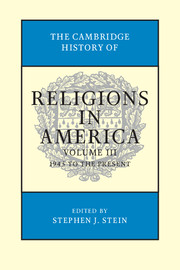Book contents
- Frontmatter
- SECTION I THE POSTWAR RELIGIOUS WORLD, 1945 AND FOLLOWING
- SECTION II CONTROVERSIAL ISSUES IN TRANSITIONAL TIMES
- SECTION III THE WORLD’s RELIGIONS IN AMERICA
- SECTION IV RELIGIOUS AND CULTURAL CONFLICT IN AMERICA
- 21 Race, Religion, and Theological Discourse
- 22 American Religion’s Fascination with Sex
- 23 Women and Religion in Modern America
- 24 “Cults” in America: Discourse and Outcomes
- 25 Religious Tensions in a Changing World
- SECTION V NEW AND CONTINUING RELIGIOUS REALITIES IN AMERICA
- SECTION VI CONCLUDING ESSAYS
- Index
- References
21 - Race, Religion, and Theological Discourse
from SECTION IV - RELIGIOUS AND CULTURAL CONFLICT IN AMERICA
Published online by Cambridge University Press: 28 July 2012
- Frontmatter
- SECTION I THE POSTWAR RELIGIOUS WORLD, 1945 AND FOLLOWING
- SECTION II CONTROVERSIAL ISSUES IN TRANSITIONAL TIMES
- SECTION III THE WORLD’s RELIGIONS IN AMERICA
- SECTION IV RELIGIOUS AND CULTURAL CONFLICT IN AMERICA
- 21 Race, Religion, and Theological Discourse
- 22 American Religion’s Fascination with Sex
- 23 Women and Religion in Modern America
- 24 “Cults” in America: Discourse and Outcomes
- 25 Religious Tensions in a Changing World
- SECTION V NEW AND CONTINUING RELIGIOUS REALITIES IN AMERICA
- SECTION VI CONCLUDING ESSAYS
- Index
- References
Summary
Whether one thinks in terms of African Americans, American Indians, Asian Americans, or Hispanics, the sociopolitical movements of the twentieth century suggest a common theme revolving around the emergence of new peoples determined to enjoy a full range of rights and opportunities – economic advancement, preservation of cultural realities, political determination, and recognition within the intellectual life of the nation. “Black Power,” “Brown Power,” “Yellow Power,” “Red Power,” and so on, echoed through various communities and became conceptual and ideological tools for framing new aesthetics as well as sociopolitical and economic change. Such varied strands of sociopolitical and cultural struggle in the United States brought into question the dominant logic of sociopolitical struggle as a “black and white” issue. However, while the framing of “the” race issue shifted, what remained somewhat consistent was the manner in which religion and theological thinking were forced to reflect this race-based struggle.
Race and racism become deeply theological issues, ones that must be addressed within the context of religious community if they are to be addressed in ways that cut through to both their existential and their ontological articulations. Through a vocabulary of transformation and a grammar of justice, white supremacy was stripped from its religious garb, and the shortcomings of Christianity as support of both subtle and aggressive manifest destiny–styled arguments were noted and vigorously critiqued.
- Type
- Chapter
- Information
- The Cambridge History of Religions in America , pp. 451 - 470Publisher: Cambridge University PressPrint publication year: 2009



